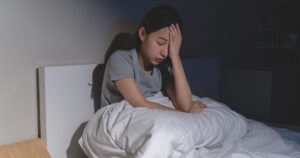
I find there are few things that can ruin a night’s sleep more than that awful sensation of jerking awake in panic.
Perhaps you’ve experienced it on occasion – most of our readers likely will have at one point or another – and if you haven’t then you can count yourself lucky. For many, the feeling of being ripped from sleep is an uncomfortable one, and is often preceded by the sensation of your body falling.
It’s like one of those dreams when you’re falling… falling… only to then start awake directly before you hit the ground. You never really get used it, unfortunately, and it can be difficult to return to a peaceful slumber after it’s happened.
But what exactly does this jerking sensation mean? Why does it appear to be a fully natural and common occurrence among most all humans? Is there anything that can be done to prevent it from happening?
Well, we’ve endeavored to do a little research on the matter, and while there are many elements of this creepy phenomenon that remain a mystery, we do have at least a few answers that might be of interest to anyone who’s ever started awake in the middle of the night with their heart feeling like it’s pounding out of their chest.
First of all, let’s start referring to the sensations by their actual name: hypnic jerks. Also known as sleep starts, they’re the sudden, oft-overwhelming muscle contractions that you can suffer from as you begin to fall asleep.
What we know
According to the Sleep Foundation, hypnic jerks typically affect one side of your body – your left arm, for example, or right leg – and their cause remains largely shrouded in uncertainty where researchers are concerned.
In fact, all we really have to go on are theories backed by the few available facts, such as the fact that hypnic jerks (hypnic being short for hypnagogic) begin in the same area of your brain that controls your startle response. Figures, right?
It just may be that when your muscles start to relax completely – an obvious and inescapable part of falling asleep – your brain sometimes believes that you are falling for real, and thus reacts by effectively jump-starting your muscles into action.
Another theory is that hypnic jerks are directly related to the dream-like imagery that can accompany them. I.e. your brain is blurring the line between the dream world and reality, thus sparking your muscles into life to produce a physical reaction to what you may be experiencing in your mind while you sleep.
Why is this happening
Knowing exactly why you’re suffering from hypnic jerks isn’t an exact science either, unfortunately, but there are a few theories out there as to what may increase the likelihood of them occurring.
As per the Sleep Foundation, certain risk factors include excessive consumption of caffeine or other stimulants, strenuous exercise before going to sleep, emotional stress, and sleep deprivation.
Stimulants such as caffeine and nicotine can play a particular role since they remain in one’s system for hours after consumption. Such products fend off fatigue and can make it more difficult to fall asleep in the first place, so perhaps it’s not all that surprising that they can lead to hypnic jerks.
Much in the same vein, vigorous exercise late in the night isn’t exactly associated with drowsily collapsing into one’s bed and drifting off to sleep. On the contrary, exercise is an energizing activity, prompting the body to feel more alert than tired.
It’s important to remember that hypnic jerks can occur at any age, just as they can take several forms and appear to be extremely common. Sleep Foundation say that up to 70% of people experience hynpic jerks, and while they can be unsettling, they are not dangerous.
What can be done?
So, all this begs the obvious question: how can we prevent or at least better manage the symptoms associated with annoying hypnic jerks?
There are actually a few things that can be done to give yourself the best possible chance at eliminating them, including adopting better sleeping habits (going to bed and waking up at the same times each evening and morning, for example), endeavoring to reduce stress levels in your life, exercising each day (though not too late in the day), minimizing your caffeine consumption, and cutting down or cutting out nicotine and alcohol.
Do you suffer from hypnic jerks? Share this article on Facebook so that we might help them too!





